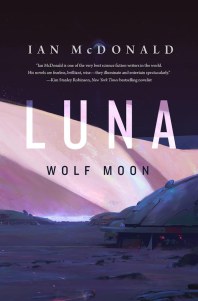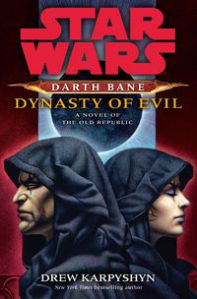 Luna: New Moon was one of my best reads of 2015 – a Shakespearian feud set on a near future moon that felt both fresh & glossy, and harsh & sprawling. If you haven’t read it, go check it out.
Luna: New Moon was one of my best reads of 2015 – a Shakespearian feud set on a near future moon that felt both fresh & glossy, and harsh & sprawling. If you haven’t read it, go check it out.
At the time we were led to believe it to be the first of a duology, but it turns out McDonald decided to write a trilogy after all.
I’m not sure that decision paid off. It’ll probably pay off in terms of total copies sold, but artistically, Luna: Wolf Moon has some problems. Not that you shouldn’t read it. If you liked New Moon, you’ll enjoy Wolf Moon too. But while overall solid & fun, it simply isn’t an as good a book. Not even close.
Writing trilogies is tricky, especially if they are one story, multiple volumes. I feel, ideally, every volume should have its own voice, or, at least, should bring something new to the table. Otherwise, the decision to go for multiple volumes published some months or years apart is only motivated by practicalities and commercial interests, not by artistic considerations.
Leckie managed to write three different books with the Imperial Radch, subtly – but to great effect. Abraham managed to do so emotionally with The Long Price quartet. And the books of Cixin’s acclaimed trilogy couldn’t be more different as far as scope goes.
What we get in Luna: Wolf Moon is more of the same. That has two effects: a significant loss of Luna‘s initial freshness & originality, plus a significant rise of boredom – especially in the second half of the book, when I started realizing it was more of the same, but not as sharp.
On top of that, there’s some other important shortcomings:
Characters don’t feel as fleshed out as in book 1.
McDonald also doesn’t expand our understanding of the lunar world: the focus remains firmly on the Corta family, the other factions remain sidekicks. McDonald wants to tell a story about the Cortas, and there’s nothing wrong with that – but the limited focus in this book is a missed opportunity to bring more depth and context to their plight.
The biggest fault of this book is a secular version of handwavium. Lucas Corta’s machinations and political scheming remain esoteric. He manages to do very big things, but it feels like magic, as we are never explained how. McDonald focuses on the practical results of the cabal wizardry, but as a reader even those results are hard to follow. If the narrative viewpoint had been singular, this would have been justifiable – I don’t expect to have auctorial access to everything – but as Lucas is one of the main characters, and what he does is crucial to this book’s plot, not explaining seems like a giant cop out.
McDonald again devotes a couple of passages to the differences between Earth’s political and economical system and that of the Moon, but nothing new is added, and frankly, it’s not at all that convincing. Characters talk multiple times about there being no real concept of possession on the Moon, but to me it feels like a superficial difference, as money/credits/whatever to buy resources is even more pivotal on the Moon than it is on Earth. Power relationships based on possession remain firmly in place. In the same way, the differences between state power, democratic or otherwise, and cooperate power to enforce laws/contracts are more a question of semantics than of political philosophy, as power relationships are still influencing the drafting of contracts – however free they are claimed to be.
So while there are hints of a post-possession society with very liberal sexual morals, this is no post-scarcity, utopian enlightened Culture. McDonald tries to say things about our contemporary world by envisioning a slighty different one, but the mirror he creates in doing so shows less depth and nuance than what Banks did with his series – what we see here is mainly greed, blood running deep, and a desire for revenge – emotions that are well enough understood today, at least since the onset of Greek theater. Not that it is uninteresting subject matter a priori, but McDonald doesn’t add a thing to what he already said in book 1.
So, if you look to be entertained, give Wolf Moon a go. There’s cool stuff here, and McDonald’s prose is good. But if you look to be intellectually challenged, I would pass.
I hope volume three will manage to redeem the trilogy – as McDonald does try, and is no pulp con man. I think he lost a bit of focus because of his own enthusiasm for the world and the characters he created, and the editors did too. A duology had been better.
Advertisements




